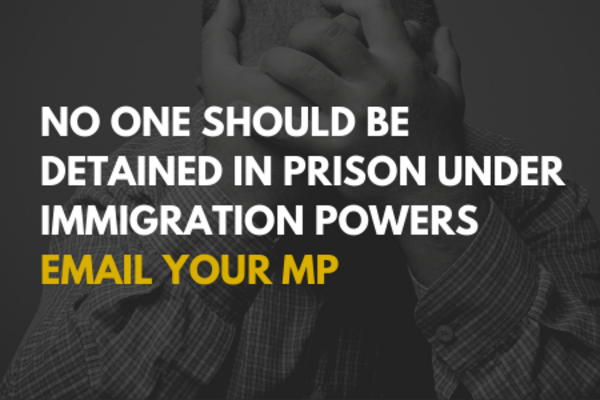Since 1999 BID have supported over 45,000 people to get out of immigration detention and we have borne witness to and evidenced many gross abuses of state power.
Yet over the course of the pandemic we have seen one of the most disturbing evolutions in the use of detention – the regular use of ‘solitary confinement’ for people detained under immigration powers in prisons.
Since March 2020 many (if not all) of our clients have been locked in their cells for anything between 22 and 24 hours a day. Our report with Medical Justice evidences the inhumane conditions our clients have endured. Behind locked doors, hidden from the public eye many have suffered immense and possibly irreversible harm as a result. They recount living in a state of endless despair:
‘The days and nights blur together during confinement. I can barely sleep at night but when I do I experience nightmares. I’m afraid of sleep because I’ll go back into the nightmare but being awake is also horrible.’
The use of ‘solitary confinement’ within prisons for immigration detention represents a sinister intensification of the ‘hostile environment’ where politics and paperwork are more important than the human rights, dignity and lives of human beings.
The Government defends its position as a necessary response to COVID-19 but the United Nations Standard Minimum Rules for the Treatment of Prisoners (The Mandela Rules) could not be clearer. Prolonged, indefinite solitary confinement is torture and torture is prohibited.
Medical evidence has shown many health risks associated with prolonged solitary confinement including depression, anxiety, paranoia, psychosis, and exacerbation of underlying mental illness, and increased mortality after release. Our report with Medical Justice seeks to amplify the voices of those that have been rendered voiceless and illustrates the staggering harm caused, through our own clients’ direct testimony alongside expert medical evidence.
“The days and nights blur together during confinement. I can barely sleep at night but when I do, I experience nightmares. I’m afraid to sleep because I’ll go back into the nightmare but being awake is also horrible. I began to lose any kind of structure in my day, my appetite, sleeping pattern and weight … There are certain things that are happening that I can’t explain. I can’t control the volume of my speech; it’s like I can’t speak loudly enough. When I do try and raise my voice to speak to prison staff, I feel like I’m shouting. I also vomit almost every morning and I don’t know why. I experience body pains; my shoulder and back have been hurting for a while now and I think this might be because there’s nothing to do all day except lie down.”
Many people are held in prolonged confinement with a cell mate (we refer to this as ‘shared confinement’). Research has shown this is also a very harmful and dangerous practice and our client’s testimonies demonstrate this.
“I could see no way out. I was hearing voices and self-harmed which led to heavy bleeding. Because of this, I was made subject to the ACDT process (Assessment Care in Detention and Teamwork). I was supposed to be monitored by staff every hour but this didn’t always happen. My cell-mate who was a source of support asked to be moved because he was so distressed by my self-harm and didn’t want to watch me die. Although I’ve now been released, I still live in fear that I’ll be re-detained and confined. I’m so anxious about this. I wouldn’t wish segregated or solitary confinement on anyone. It was the most harrowing experience. I still experience nightmares and sometimes when I’m alone and upset, I hear voices. I don’t know what’s wrong with me.”
For people detained under immigration powers in prison, the harm caused by prolonged solitary or shared conferment is aggravated by the indefinite nature of their detention and the fact that the individual is required to take proactive steps to challenge their detention or deportation with very limited access to legal advice.
Solitary confinement which is indefinite or without a known end date has been demonstrated to be particularly damaging and studies have evidenced that “an important element in the level of endurance of solitary confinement is prior knowledge of its duration” .
The legal purpose of immigration detention cannot be reconciled with the conditions in which it is currently taking place. This inhumane practice must stop.
Write to your MP asking them to stop detaining people in prison.
A note on how this impacts all people in prison
Everybody in prison is being subjected to extremely severe lockdown conditions including solitary and shared confinement that are inhumane regardless of the legal powers that the individual is being held under. Our work is driven by the experiences of our clients in immigration detention and our report reflects this but our solidarity extends to everyone in prison, their loved ones and the organisations supporting them.









